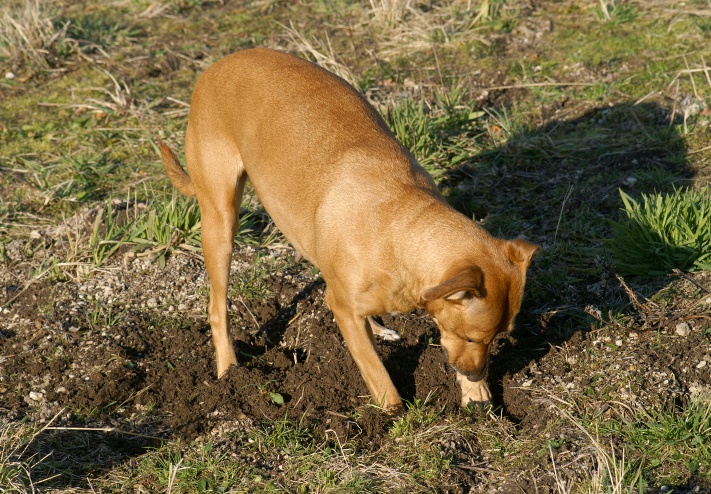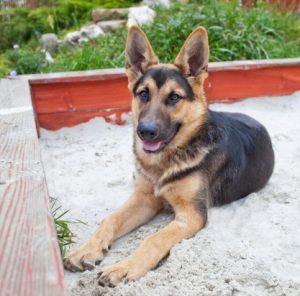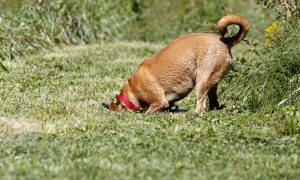“This post contains affiliate links, and I will be compensated if you make a purchase after clicking on my links.”

Dear Steve,
How can I prevent my Boxer from digging up my yard?? She is kept outside with my other 3 dogs when it is nice outside while we are at work. She is the only one who digs. She has dug so many holes and ditches we can’t even mow. My husband is fed up, please help!
– Mindy
I am glad you wrote in with this question, Mindy. Now that spring is here (finally), hole digging is a challenge that plagues many dog owners.
First off, it’s critical we understand that hole digging is often times a symptom of a greater underlying cause. In order to solve a dog’s hole digging issues, we must accurately determine the root cause (no pun intended). Most people make the mistake of attacking the symptom, rather than the cause.
Here is a short list of the most common causes and possible solutions:
– Separation Anxiety: See my article and video on Separation Anxiety.
– Pent Up Energy: You need to sufficiently relieve your dog’s mental and physical energy before leaving them unsupervised in the yard. A fenced in yard is a great asset, but it’ not a replacement for a structured walk, play session, and obedience training. Read my in-depth article on relieving pent up energy.
– Dog Is Hot Or Cold: A dog who is hot or cold will seek shelter for relief. It’s essential to provide adequate shelter and resources (water, blankets, etc.). Not only is withholding these resources inhumane, it may also lead to hole digging.
– Moles In Yard: If your yard has moles, your dog will know it. Most dogs will dig holes in order to try and seek out the moles. Contact a professional for mole elimination.
– Dog Is Bored Outside: A bored dog will look to entertain themselves (in the form of digging). In order to mitigate this, provide your dog with special toys that they only have access to in the yard. These toys should be different than ones they have in the home. This will help to maintain the novelty factor and engagement with the toy when in the yard.
An appropriate assessment is essential to creating an accurate and effective training plan. If you determined the underlying cause and sufficiently tried to fulfill that need, but hole digging still occurs, you have two options:

Option one is to utilize a short or long-term management plan. One long-term management choice is to simply not allow them unsupervised access to the yard. You have no recourse if your dog is unsupervised, but if you are present you can intervene and interrupt the digging. Another management possibility is to provide your dog an acceptable “digging area”, such as a sand box filled with dirt. You can read my full article on management here in order to learn more.
If you feel your dog’s hole digging is impeding your quality of life, then your second option is to contact a qualified professional in your area. An experienced trainer should be able to take you through more in-depth one-on-one training which can help you solve this issue.
As with all aspects of dog training, an appropriate training plan based on the individual dog and owner’s lifestyle is essential. Not only to make training fair to your dog, but also to ensure a successful training outcome.
Steve Reid is a Certified Dog Trainer and owner of S.R. Dog Training in Westchester, NY. For more information about S. R. Dog Training and to sign-up for his newsletter, visit www.srdogtraining.com. Please also become a fan of Steve on Facebook at www.Facebook.com/SRDogTraining.



















Giathomas
May 26, 2015 at 5:28 pm
I love dogs
Giathomas
May 26, 2015 at 5:27 pm
I love cats and dogs
Steve McLean
May 26, 2015 at 3:55 pm
A breeder told me YEARS ago to put some of the dog’s poop in a recently dug hole or someplace the dog has been known to dig previously. It has always worked for me but I’ll bet that the dog isn’t getting enough exercise is part of the equation, as well, and separation anxiety certainly enters into it.